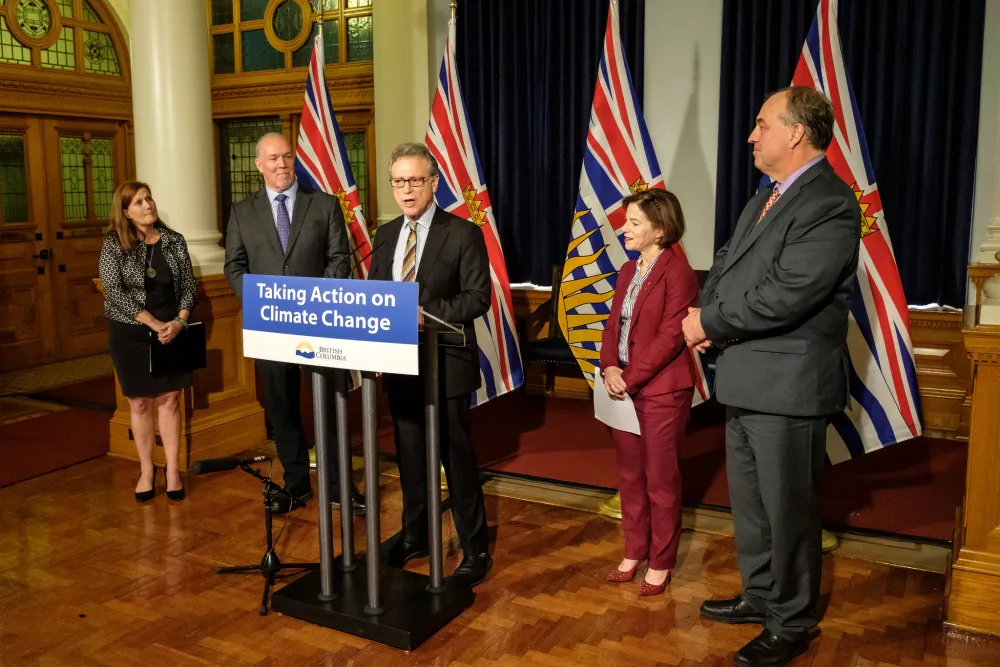VANCOUVER / MUSQUEAM, SQUAMISH & TSLEIL-WAUTUTH TERRITORIES — Karen Tam Wu, B.C. director at the Pembina Institute and a member of B.C.’s Climate Solutions and Clean Growth Advisory Council, made the following statement today in response to the release of the B.C. government’s new climate and clean growth plan:
“Today is a good day for Canada. British Columbia has introduced a bold plan that promises to power up the clean economy and get the province back on track to its climate goals. British Columbians can take pride in the fact that the CleanBC strategy contains several policies that are far ahead of the curve in Canada and North America.
“This forward-looking plan signals an exciting vision for a clean economy. In just over 10 years, all new homes and buildings will be low carbon. More electric vehicles will be on the roads; in just over 20 years, all new cars sold will be zero emissions. Going forward, we will generate more clean electricity and renewable fuels, and burn less oil and gas.
“The plan aims to support all British Columbians — for instance, by making social housing safer, more comfortable, and more affordable to heat, and by getting remote communities off diesel generators. Today’s strategy prioritizes innovation and skills upgrading — with dollars to increase capacity to produce renewable fuels in B.C., and provide training so we have the workforce to construct low carbon buildings and repair electric vehicles.
“This puts B.C. on a path to getting 75 per cent of the way to our 2030 target for reducing carbon pollution. We still expect to see a plan that demonstrates how we will fully meet B.C.’s climate targets. The government has indicated the remaining areas where we need to cut emissions and given itself a deadline. We will continue to work with government, businesses, and communities to bridge the gap. Let’s keep up the momentum.
“A transparent process for tracking our progress and making timely adjustments is crucial to ensuring we don’t miss our climate targets again. Importantly, B.C. is promising to be the first Canadian province to back up its climate plan with an accountability mechanism. With other provinces faltering on climate action, B.C.’s climate strategy brings hope for all Canadians concerned about the well-being of their families and communities.”
Quick facts
- B.C.’s carbon pollution in 2016: 62.3 million tonnes (Mt CO2e)
- Projected pollution in 2030 under CleanBC measures: 44.8 Mt
- Legislated target for 2030: 38.2 Mt
- Legislated target for 2040: 25.5 Mt
- Legislated target for 2050: 12.7 Mt
- Carbon pollution cuts through initiatives involving waste, community planning and transit, freight, industrial electrification, clean electricity, agriculture, and technology are needed to close the 6.6-Mt gap to B.C.’s 2030 climate target.
- By sector, industry is responsible for 40 per cent of B.C.’s carbon pollution, transportation for 38 per cent, and buildings and communities for 22 per cent.
- To meet its 2050 climate target, the Pembina Institute estimates B.C. needs to retrofit 30,000 houses, 17,000 apartment units, and three million square feet of commercial space each year between now and then.
[30]
Note for media: Pembina Institute experts are attending the government’s announcement and available for interviews on site. (English/Deutsch)
Join the conversation on Twitter: #CleanBC @Pembina
Contact
Stephen Hui
Communications Lead, Pembina Institute
778-987-7654
stephenh@pembina.org
Tw: @StephenHui
Background
Submissions: Securing a clean growth future for B.C.’s buildings, industry, and transportation
Backgrounder: Limiting Methane Pollution from B.C.’s Gas Sector
Letter: A climate accountability framework for B.C.
About the Pembina Institute
The Pembina Institute is a non-profit think-tank that advocates for strong, effective policies to support Canada’s clean energy transition. We have offices in Vancouver, Calgary, Edmonton, Toronto, and Ottawa. Learn more: www.pembina.org






